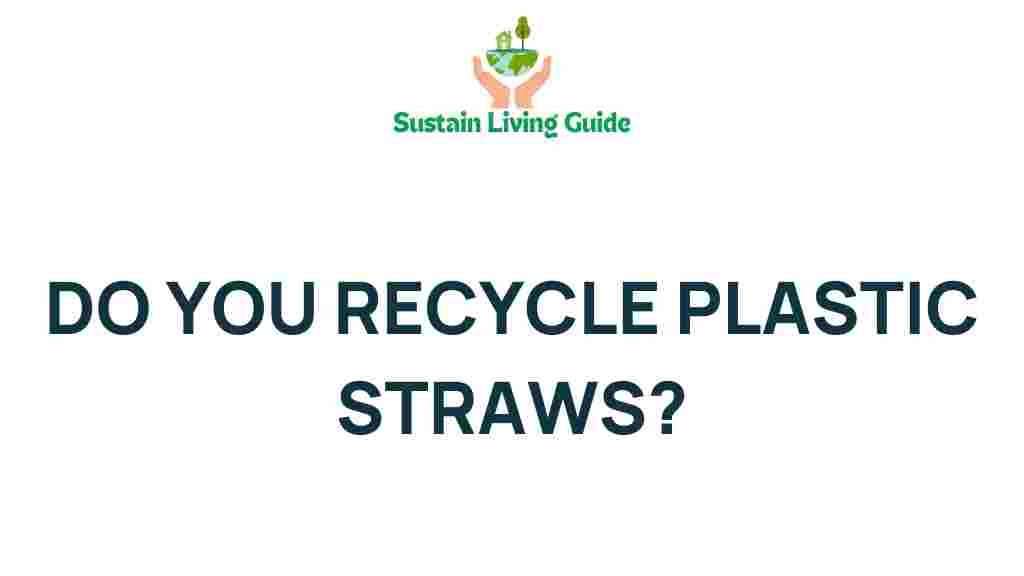The Hidden Truth About Recycling Plastic Straws: What You Need to Know
In recent years, the conversation surrounding plastic waste has intensified, particularly with items like plastic straws coming under scrutiny. As consumers become more environmentally conscious, understanding the recycling process of plastic straws is essential. Many people believe that recycling plastic straws is a straightforward task, but the reality is more complex. This article dives into the hidden truths about recycling plastic straws, providing you with the knowledge you need to make informed decisions.
Understanding Plastic Straws
Plastic straws are primarily made from polypropylene, a type of plastic that is lightweight yet durable. They are often used in restaurants, cafes, and at home, making them a ubiquitous item in our daily lives. However, their convenience comes at a cost:
- Plastic straws can take hundreds of years to decompose.
- They contribute significantly to ocean pollution, threatening marine life.
- Most recycling facilities do not accept them due to their size and shape.
So, what happens to these straws once they are discarded? Understanding the recycling process is crucial to mitigating their impact on the environment.
The Recycling Process
The recycling process for plastic items like straws typically involves several steps:
- Collection: Straws are usually mixed in with general waste, which makes collection for recycling difficult.
- Sorting: Most recycling facilities sort materials by type. Straws often get overlooked or sent to landfills due to their lightweight nature.
- Cleaning: Recyclable plastics must be cleaned to remove contaminants, but straws can be hard to clean effectively.
- Shredding: Once sorted and cleaned, plastics are shredded into smaller pieces, making them easier to process.
- Reprocessing: Finally, the shredded material is melted down and molded into new products. However, this stage often excludes straws due to their low recycling rates.
The Challenges of Recycling Plastic Straws
Despite the apparent steps involved in recycling, there are several challenges that hinder the effective recycling of plastic straws:
- Size and Shape: Straws are small, flexible, and often get lost in the recycling stream, making them hard to separate.
- Contamination: Straws are often contaminated with food and drink residues, which can affect the quality of recycled materials.
- Low Demand: There is minimal demand for recycled straws, making it economically unfeasible for recycling facilities to process them.
Alternatives to Plastic Straws
Given the challenges associated with recycling plastic straws, many people are turning to alternatives that are more environmentally friendly. Here are some viable options:
- Paper Straws: Biodegradable and compostable, paper straws are a popular choice for many businesses.
- Metal Straws: Durable and reusable, metal straws are an excellent option for those looking to reduce single-use plastic.
- Silicone Straws: Flexible and easy to clean, silicone straws can be reused multiple times.
- Bamboo Straws: Eco-friendly and stylish, bamboo straws are a natural alternative to plastic.
How to Dispose of Plastic Straws Properly
If you find yourself in a situation where you have plastic straws, it’s crucial to dispose of them correctly. Here are some tips:
- Check Local Recycling Guidelines: Always refer to your local recycling program to see if they accept plastic straws.
- Reduce Usage: Whenever possible, opt for drinks without straws or bring your reusable straw.
- Educate Others: Encourage friends and family to understand the importance of reducing plastic waste.
Troubleshooting Common Misconceptions
Many misconceptions persist regarding the recycling of plastic straws. Here are some common myths and the truths behind them:
- Myth: All plastics can be recycled.
Truth: Not all plastics are accepted in recycling programs; straws are often excluded. - Myth: Recycling plastic straws is easy.
Truth: Straws are one of the hardest items to recycle due to their size and shape. - Myth: Using biodegradable straws means no environmental impact.
Truth: While better, biodegradable straws still require proper disposal to minimize impact.
Conclusion
Understanding the hidden truths about recycling plastic straws is crucial for making informed decisions about their use and disposal. Although the recycling process exists, plastic straws face significant challenges that often result in them ending up in landfills or oceans. By choosing alternatives, reducing usage, and properly disposing of straws, we can collectively make a significant impact on reducing plastic waste.
For more information on eco-friendly alternatives and sustainable practices, visit this resource. And remember, every small action counts in the fight against plastic pollution!
This article is in the category Waste and created by SustainLivingGuide Team
